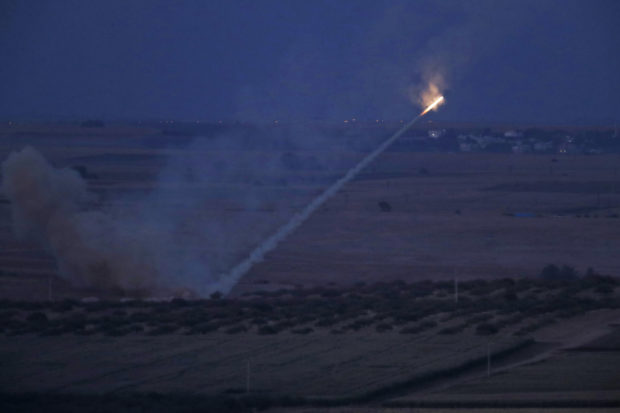Russia seeks to cement its role as power broker in Syria
CEYLANPINAR, Turkey – Russia moved to fill the void left by the United States in northern Syria on Tuesday, deploying troops to keep apart advancing Syrian government forces and Turkish troops. At the same time, tensions grew within NATO as Turkey defied growing condemnation of its invasion from its Western allies.

In this photo taken from the Turkish side of the border between Turkey and Syria, in Ceylanpinar, Sanliurfa province, southeastern Turkey, Turkish forces fire rockets towards targets in Ras al-Ayn, Syria, Tuesday, Oct. 15, 2019. (AP Photo/Lefteris Pitarakis)
Now in its seventh day, Turkey’s offensive against Kurdish fighters has caused tens of thousands to flee their homes, has upended alliances and is re-drawing the map of northern Syria for yet another time in the 8-year-old war.
Russia moved quickly to further entrench its role as a power broker after U.S. President Donald Trump ordered the pullout of American forces in northeastern Syria. The American move effectively abandoned the Kurdish fighters who were allied with the U.S. and cleared the way for Turkey’s invasion aimed at crushing them.
Desperate for a new protector, the Kurdish administration struck a deal with the Russia-backed government of Syrian President Bashar Assad, whose forces on Sunday began moving into Kurdish-administered areas to shield them against Turkey.
Syrian troops waved flags after they rolled into Manbij, a flashpoint town west of the Euphrates River that Turkey had been aiming to capture and wrest from Kurdish control. Video by Russian journalists with the troops showed what appeared to be an abandoned outpost where U.S. forces had been stationed.
A U.S. military spokesman, Col. Myles B. Caggins, confirmed U.S. troops had completed their pullout from Manbij. During the withdrawal, contacts were kept open with the Turks and Russians to ensure the several hundred American forces there got out safely, U.S. officials said.
U.S. troops have had outposts in Manbij since 2017, when they went in to avert a battle over the town between Turkish and Kurdish fighters.
Now Russia was playing that role. Outside Manbij, Russian troops patrolled front lines between Turkish and Syrian army positions to keep them apart, Russia’s Defense Ministry said.
“No one is interested” in fighting between Syrian government troops and Turkish forces, said Alexander Lavrentyev, Moscow’s envoy for Syria. Russia “is not going to allow it,” he told Russian state news agencies.
Kelly Craft, the U.S. ambassador to the United Nations, told reporters Washington is “deeply concerned” that Russian troops are patrolling between the two sides.
Russian Defense Minister Sergei Shoigu spoke to U.S. Defense Secretary Mark Esper to discuss “issues of mutual interest in the context of situation in Syria,” the Russian Defense Ministry said in a brief statement, without elaborating.
Russia has been a staunch ally of Assad for decades and entered the Syrian conflict in 2015, providing air power that eventually turned the tide of the war in his favor. The Russian military has shipped weapons to Damascus, trained thousands of troops and put its advisers in key Syrian military units.
In the first week of the Turkish assault, at least 154 fighters from the Kurdish-led Syrian Democratic Forces have been killed, as well as 128 fighters from Turkish-backed Syrian factions , according to the Syrian Observatory for Human Rights, a monitor of the war. It said at least 69 civilians have been killed in Syria. Turkey says six of its soldiers have died, as well as at least 20 Turkish civilians killed by Kurdish mortar fire across the border.
Despite the Syrian and Russian deployments, Turkey insisted it would capture Manbij. Asked on Sky News if Turkey’s military was willing to fight Assad’s army, Vice President Fuat Oktay said, “We hope it’s not going to happen, but again we are determined to get control over Manbij.”
Mortar fire from Manbij killed two Turkish soldiers and wounded seven others, the Turkish Defense Ministry said. An Associated Press team later saw up to 200 Turkish troops along with armored vehicles crossing near Manbij and Kobani, a border town that is not yet secured by Syrian forces. Farther east on the border, Turkish and Kurdish forces were in heavy battles over the town of Ras al-Ayn, captured by Turkish troops days earlier.
A U.S. official said the approximately 1,000 U.S. troops being withdrawn from northern Syria will reposition in Iraq, Kuwait and possibly Jordan. The U.S. forces in Iraq could conduct cross-border operations against the Islamic State group in Syria as they did before creating the now-abandoned partnership with Syrian Kurdish-led forces, the official said, speaking on condition of anonymity to discuss sensitive planning for a U.S. pullout.
After opening the way for the Turkish assault with its pullout, Washington is now trying to restrain its fellow NATO member.
Trump on Monday announced sanctions aimed at Turkey’s economy. The U.S. called on Turkey to stop the offensive and declare a cease-fire, while European Union countries moved to broaden an arms sale embargo against their easternmost ally.
Trump was sending Vice President Mike Pence, Secretary of State Mike Pompeo and national security adviser Robert O’Brien to Ankara to try to begin negotiations to stop the fighting. Pence said Trump spoke directly to Turkish President Recep Tayyip Erdogan, who promised not to attack the border town of Kobani, which in 2015 saw the Islamic State group’s first defeat in a battle by the U.S.-backed Kurdish fighters.
Erdogan made clear, however, that he had no intention of halting the Turkish offensive. “They say ‘declare a ceasefire.’ We could never declare a ceasefire,” he told reporters.
The U.N. Security Council planned a closed meeting Wednesday on the situation, requested by Germany and other EU members. “Everybody hopes that … we can do something to bring back the parties to the peace process,” said the current Security Council president, South Africa’s U.N. Ambassador Jerry Matjila. /gsg